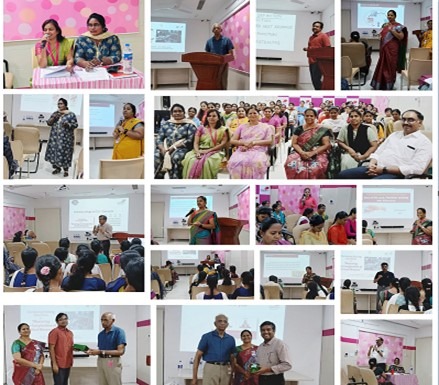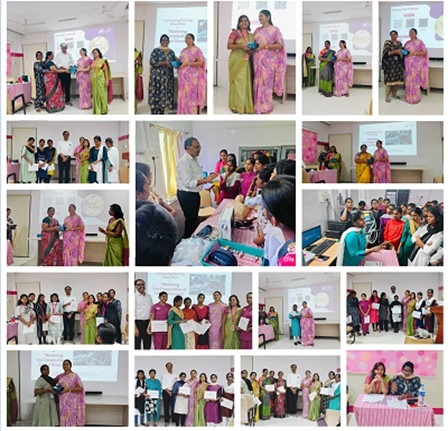In-house Continuing Nursing Education (CNE) on mastering the complexities of critical illnesses at Kauvery Hospital, Tennur, 2024
Lucy Grace. T1, Jaya Menon2*
1Nurse Educator, Kauvery Hospital, Tennur, Trichy
2Nursing Superintendent, Kauvery Hospital, Tennur, Trichy
Background
The Continuing Nursing Education (CNE) program titled “Mastering the Complexities of Critical Illnesses” was held on August 24, 2024, from 9 am. to 5 pm. at the A-V Conference Hall, Tennur, and Kauvery Hospital in Trichy. 50 staff nurses attended this one-day event across the Trichy region, as well as doctors and distinguished speakers.
The total members who attended this event is 50 and that includes;
- Organizing Chairperson – 1
- Organizing Secretary – 1
- Doctors – 3
- Speakers – 8
- Delegates – 37 (Tennur-19, Cantonment-6, Heartcity-6 and Maa Kauvery-6)
Under the patronage of Dr. Senthil Velmurugan, Senior Consultant Radiologist and Medical Administrator at Kauvery Hospital, Tennur, and with the support of organizing chairperson Ms. Jaya Menon, the Nursing Superintendent, myself, Ms. Lucy Grace, as the organizing secretary conducted the event. Dr. Venkita. S. Suresh, our group medical director was a moderator, mentor and a constant source of support throughout the program. The dedicated speakers and nursing in-charges, and we, the organizing team, worked collaboratively to ensure the event’s success.
We began the registration process online, and following registration, we conducted a pre-test using a QR code for efficient assessment.
The morning sessions included theoretical coverage of topics such as preventing healthcare-associated infections and ensuring a safe environment, strategies for assessing and managing pain in critically ill patients, sepsis management, neurological emergencies, meeting the nutritional needs of critically ill patients, pharmacology in critical care, and ethical issues in critical care.
In the afternoon, participants engaged in three interactive stations: ACLS for managing cardiac emergencies and life-threatening arrhythmias, basic ventilator settings and troubleshooting, and hemodynamic monitoring with a focus on interpreting various parameters.
Program Aim
The primary aim of this program was to equip healthcare professionals with the knowledge and skills necessary to effectively manage and treat patients with critical illnesses. This was achieved by helping participants master the complexities associated with these conditions.
Program Goals
The program’s goal was to foster proficiency in understanding and managing the complexities of critical illness. By doing so, it aimed to ensure improved patient outcomes and advance competency in critical care practices.
Session Highlights
The Morning Session
The program featured several informative sessions. Ms. Suganya presented the first topic, “Preventing Healthcare-Associated Infections and Ensuring a Safe Environment,” She emphasized essential infection prevention practices in the ICU, including the importance of hand hygiene, personal protective equipment (PPE), biomedical waste management (BMW), and isolation precautions.
Ms. R. Kasthuri presented the second topic, “Strategies for Assessing and Managing Pain in Critically Ill Patients,” She provided a clear overview of pain assessment tools, such as the Behavioural Assessment Tool and the Critical Pain Observation Tool (CPOT), offering practical insights into their application.
The third topic covered “Sepsis Management, focusing on early recognition, fluid resuscitation and antibiotic therapy, presented by Dr. Ramanathan, a consultant anesthetist in the intensive care unit. He explained the various types of sepsis, the critical role of culture, septic shock, and how to classify and select appropriate antibiotics.
The fourth topic was Neurological Emergencies, including the assessment and management of strokes, seizures, and traumatic brain injuries, led by Ms. Leema Rebekkal Rosy. She thoroughly discussed the pathophysiology and risk factors associated with each condition, outlined neurological assessment techniques, initial management and treatment strategies, and emphasized the crucial nursing roles in caring for patients with these emergencies.
Following these, the next session focused on “Meeting the Nutritional Needs of Critically Ill Patients,” led by Ms. Anandhi, Emergency Department Incharge. She addressed the nutritional challenges in critical care units, including methods for assessing nutritional status, BMI calculation, and determining nutritional requirements specific to these settings.
The next topic, presented by Dr. K. Senthil Kumar, MD., FIPM., PGDMLE., HOD of Anaesthesiology and Toxicology, focused on “pharmacology in critical care” He provided a detailed explanation of common drugs used in critical care units, including sedatives, analgesics, and vasopressors, highlighting their actions and cautions. Additionally, he covered non-steroidal anti-inflammatory drugs, insulin types, drug dilution, and calculation, and emphasized the importance of assessing the FASTHUGBIT mnemonic in managing critically ill patients.
The final topic, “Ethical Issues in Critical Care,” was presented by Ms. Sagayaselvi, ANS, who emphasized the importance of ethical considerations in critical care, including end-of-life care dilemmas, core goals of end-of-life care (EOLC), decision-making in critical illnesses, legal and policy considerations, and best practices for ethical decision-making in these units.
The Afternoon Session
The Advanced Cardiac Life Support (ACLS) station, led by Dr. Karuppaiah, MD, an Accident and Emergency Medicine Consultant, focused on managing cardiac emergencies and life-threatening arrhythmias. He provided clear demonstrations and explanations of arrhythmias and related drugs, engaging staff in active participation.
G. Kasthuri, ICU Incharge, who covered different types of ventilators, various ventilator modes, settings, and troubleshooting techniques, conducted the second station, on “Basic ventilator settings”.
The third station, led by Ms. Kalaiarasi, Incharge in the critical care unit, focused on “Hemodynamic Monitoring,” where she detailed the use of basic monitors, the differentiation of parameters, and the immediate actions required in response to various readings.
Feedback Summary
After the stations, the staff completed a post-test using an online QR code. Feedback from various units was highly positive, reflecting well on the organizing team and speakers.
Certificates were then handed out to all delegates. The program wrapped up at 5 p.m. with a vote of thanks and was followed by refreshments.
Conclusion
Overall, the in-house CNE conference was a valuable experience for all staff nurses, providing clarity on their doubts and boosting their confidence to effectively manage and treat critically ill patients. The conference facilitated hands-on learning through interactive stations, enhanced understanding of complex topics, and encouraged collaboration among staff nurses. Additionally, the positive feedback and engagement from participants underscored the success of the event and its impact on improving patient care in critical settings.
Photo gallery



